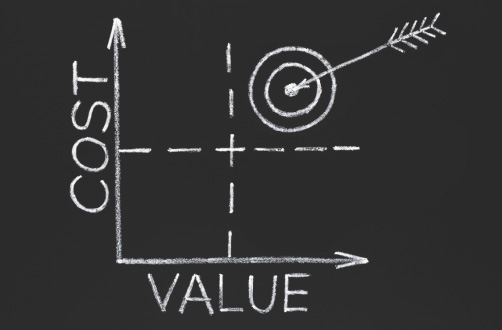
Price “should” have a direct correlation to value. The right value drives the right price. The higher the perceived value, the higher the acceptable price. The lower the perceived value, the lower tolerance for price. It’s really simple. If you want to keep your prospects and customers buying, make sure the value in what your selling is commiserate with what they are paying AND that they see it. Get out of whack or they don’t see the value and you’re fucked.
About 10 years ago, I had just taken a position as a head of sales with a telecom company. It was the first month and I was thrust into a contract negotiation where the team was telling me we needed to lower our pricing to keep one of our biggest customers. I wasn’t convinced. I pushed the team to explain why or where our value had been eroded. They said it hadn’t. I then asked where the customer could go to get the same level of service at the same value. They couldn’t tell me. To be fair, they did say the customer could do it themselves and probably would if we didn’t bring the price down. I was not convinced.
After several rounds of debate and discussion, I tell the team they can’t provide a discount. As I saw things, the value we were providing the customer was worth every penny we were charging. My team, and in particular, one person on the team told me I was wrong (not so politely or respectfully as I recall, he pretty much was a notch down from calling me a fucking idiot.) and that we were going to lose the customer and they were going to leave us if we didn’t offer them lower pricing. They were so adamant, that they tried to convince me that if we sent them the same pricing from the current contract, the customer would walk away and we wouldn’t even have a chance to engage with them. They said it would be over immediately and we’d have no chance to save it. This is when I knew my team had lost control and were afraid.
No client walks away on price alone unless they don’t see the value for that price in the first place and demonstrating value is the sales person’s job.
This past week I was working with a client and one of the sales people was about to send pricing to a prospect. It was the biggest deal this sales person had worked on and it will be his biggest deal if he closes it. The CEO and he are talking about pricing and how much they should charge. The sales person wants to quote a 40% discount. He says if he doesn’t, they will walk away and he’ll lose the deal. I push him on this. Why do you think they’ll just walk away, leaving you at the alter? He say’s he’s not sure, it’s just his gut. Needless to say, this sales person is convinced standard pricing is too high and is terrified that if he sends over standard pricing he’ll lose the deal. And that’s when I knew — he hadn’t sold the customer. He’d been a glorified order taker and now he’s paying the price.
After good debate, the CEO and I let him provide a “volume” discount of 10% and nothing more. There was no way he was going to provide a 40% discount out of the box on “gut.” The sales person pushed back. He had convinced himself that we would lose the deal and we’d never hear from them again and that’s when I said;
If your pricing scares them off to the point where they won’t even engage with you, then you haven’t sold them a thing and they aren’t a real prospect in the first place.
He sent the pricing without the monster discount and guess what. They didn’t run away. They didn’t lose their shit. They asked some legitimate questions and are still in the funnel, moving forward.
Here’s the deal, if you’re afraid of the pricing you’re about to deliver, that’s the little voice inside your head telling you, you haven’t sold shit and they don’t see the value. When you’re not confident in your pricing it means you’re not confident in the value of what you’re selling OR you know you haven’t shown it to them and that’s a problem.
Listen to that little voice, it’s telling you something. It’s telling you whether you’ve done a good job selling or whether you haven’t.
If it’s telling you, you haven’t, get selling it’s your job.


